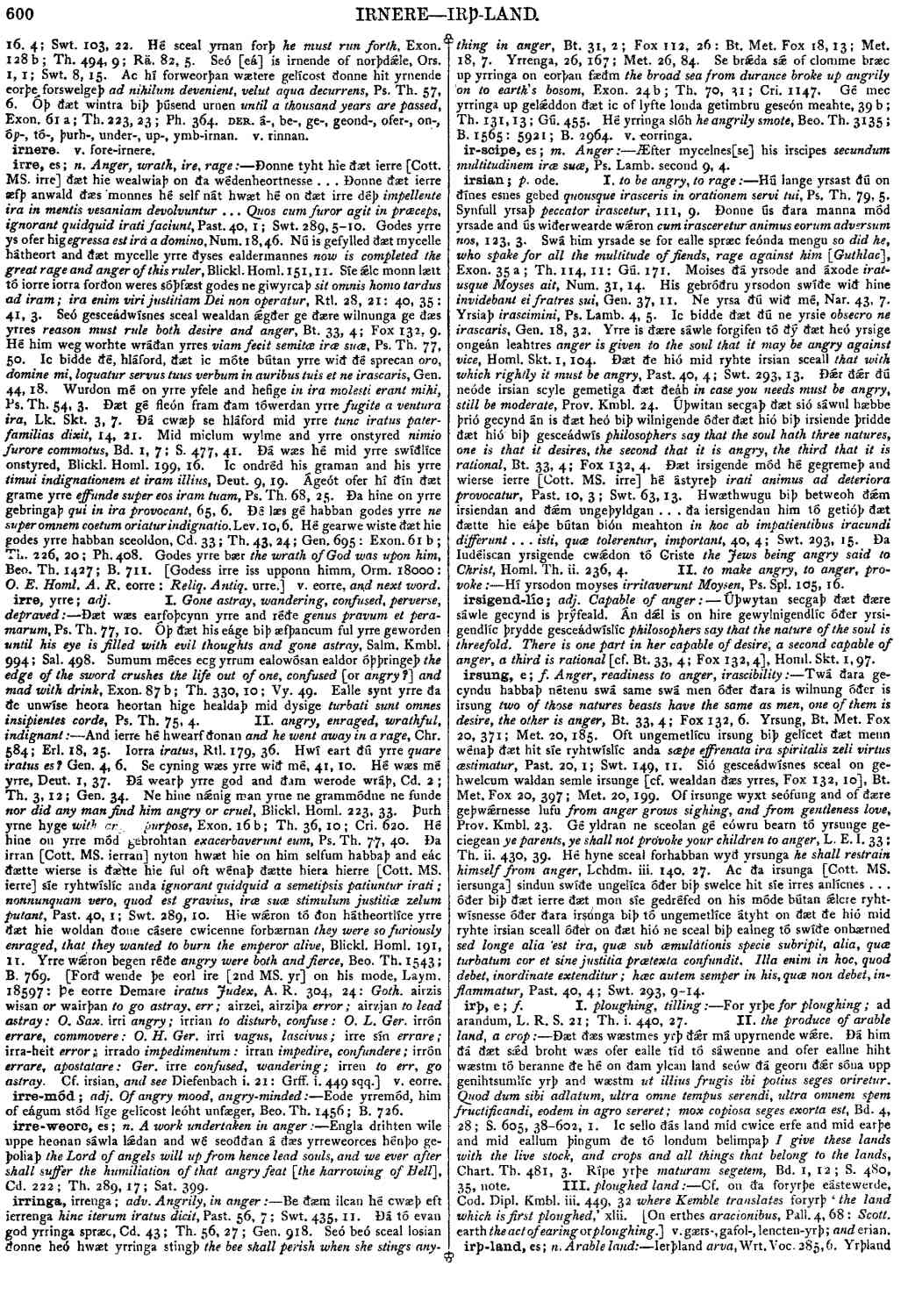irre
- adjective
-
Ðæt wæs earfoþcynn yrre and réðe
genus pravum et peramarum,
- Ps. Th. 77, 10 .
-
Óþ ðæt his eáge biþ æfþancum ful yrre geworden
until his eye is filled with evil thoughts and gone astray,
- Salm. Kmbl. 994 ;
- Sal. 498 .
-
Sumum méces ecg yrrum ealowósan ealdor óþþringeþ
the edge of the sword crushes the life out of one, confused [or angry?] and mad with drink,
- Exon. 87 b ;
- Th. 330, 10 ;
- Vy. 49 .
-
Ealle synt yrre ða ðe unwíse heora heortan hige healdaþ mid dysige
turbati sunt omnes insipientes corde,
- Ps. Th. 75, 4 .
-
And ierre hé hwearf ðonan
and he went away in a rage,
- Chr. 584 ;
- Erl, 18, 25 .
-
Iorra
iratus,
- Rtl. 179, 36 .
-
Hwí eart ðú yrre
quare iratus es?
- Gen. 4, 6 .
-
Se cyning wæs yrre wið mé,
- 41, 10 .
-
Hé wæs mé yrre,
- Deut. 1, 37 .
-
Ðá wearþ, yrre god and ðam werode wráþ,
- Cd. 2 ;
- Th. 3, 12 ;
- Gen. 34 .
-
Ne hine nǽnig man yrne ne grammódne ne funde
nor did any man find him angry or cruel,
- Blickl. Homl. 223, 33 .
-
Þurh yrne hyge
with anger, purpose,
- Exon. 16 b ;
- Th. 36, 10 ;
- Cri. 620 .
-
Hé hine on yrre mód gebrohtan
exacerbaverunt eum,
- Ps. Th. 77, 40 .
-
Ða irran [Cott. MS. ierran] nyton hwæt hie on him selfum habbaþ and eác ðætte wierse is ðætte hie ful oft wénaþ ðætte hiera hierre [Cott. MS. ierre] síe ryhtwíslíc anda
ignorant quidquid a semetipsis patiuntur irati ; nonnunquam vero, quod est gravius, iræ suæ stimulum justitiæ zelum putant,
- Past. 40, 1 ;
- Swt. 289, 10.
-
Hie wǽron tó ðon hátheortlíce yrre ðæt hie woldan ðone cásere cwicenne forbærnan
they were so furiously enraged, that they wanted to burn the emperor alive,
- Blickl. Homl. 191, 11 .
-
Yrre wǽron begen réðe
angry were both and fierce,
- Beo. Th. 1543 ;
- B. 769 .
Bosworth, Joseph. “irre.” In An Anglo-Saxon Dictionary Online, edited by Thomas Northcote Toller, Christ Sean, and Ondřej Tichy. Prague: Faculty of Arts, Charles University, 2014. https://bosworthtoller.com/20789.
Checked: 1